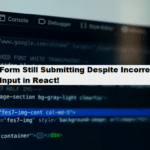The issue arises because printf treats % as a special character, and when you double it (using %%), it escapes correctly for output, but the textarea still shows the doubled characters. Since printf is designed for formatted output, and you’re dealing with multiple variables (like record numbers) while trying to handle a literal %, there is a better approach.
You can use sprintf to format your string and then echo the result into the textarea. This way, you still have the flexibility of printf but avoid the issues with escaping % within the textarea.
Solution:
You can use sprintf to format the string (which handles your variables like record numbers), and then simply output it using echo in the textarea.
Here’s an example:
Example:
#php
<?php
// Assume this comes from your database and contains a '%'
$recordNumber = 123;
$valueFromDatabase = "Discount is 25%";
// Use sprintf to format the string with record number and other values
$formattedOutput = sprintf("Record #%d: %s", $recordNumber, $valueFromDatabase);
?>
<!-- Output the formatted string into the textarea -->
<textarea><?php echo htmlspecialchars($formattedOutput); ?></textarea>Review:
sprintf: This formats your string with any necessary variables (like record number), handling%properly within the string. Since it returns a string, you avoid the need forprintfto directly output the content.htmlspecialchars: Ensures that special HTML characters like<,>,&, and"are encoded properly to avoid HTML injection and display issues in thetextarea. This is especially useful for values that might contain characters like&.
Why this works:
sprintfallows you to use all the formatting capabilities ofprintfwithout directly echoing to the output, making it easier to handle formatting and escaping.- The
textareawill display the correct percentage symbol (%), and you won’t have to deal with the doubling of%%or escaping issues.
This method keeps your code maintainable while providing the flexibility of printf formatting.
Benefits of Using Coding Filters in Software Development!
Using coding filters brings numerous benefits to software development, such as improved code maintainability, easier debugging, and better performance. By isolating specific logic or conditions, developers can minimize the risk of errors and make their code more modular, readable, and adaptable to changes.




